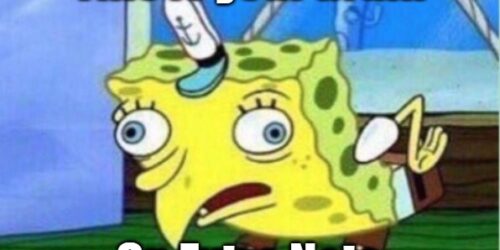Shocking Scenes: How Far Is too Far?
Editing your own podcast can be an introspective experience. We record Words About Books episodes much faster than we can edit them. Often, enough time passes between recording and editing that I will have forgotten which points we brought up. I definitely do not remember what exactly I said. It may interest listeners to know that Nate does not share my weak memory. He often remembers our conversations in detail years after the fact. For me, listening to an old episode is always filled with surprises. When I sit down to edit, I load the tracks up in Audacity and start listening to them. I look for content to cut, audio levels to adjust, filler words to remove, audio gags to insert, etc.
Usually, I’ll find myself listening to myself making a point and I will finish the sentences of my past self before he has a chance to speak them. That’s usually a good sign. It means that I wasn’t just rambling and that I succeeded in communicating a genuine opinion. Unfortunately, it isn’t always the case that I agree with my former self. There are no shortage of examples where I have found myself not liking the way a certain point is argued. There are also a few examples where I find myself emphatically disagreeing with myself and wondering how this guy, who is me, could be so stupid. Hearing yourself earnestly arguing a point, and hearing your own words ringing hollow in your ears is a very humbling experience. A common question that people ask of podcasters is: What is the most interesting thing you have learned from podcasting? My answer to this question would be that I’ve learned to accept just how flawed my logic is and that I need to be more open to changing my views.
Recently on the podcast we covered The Southern Bookclub’s Guide to Slaying Vampires by Grady Hendrix. In my Goodreads review of the book I give the following content warnings: Sexual Violence, Violence Against Children, Domestic Violence, Suicide, Gaslighting. I also give the book a negative review. The main reason that I give for this is that I don’t like the way that these intensely traumatic events are used in the story. After hearing myself explain why these events ruined the book for me, though, I feel like there’s still something missing. I don’t think that I fully understood why I didn’t like the book when I wrote that review.
I realized that my own understanding and expectations of this book were flawed when I heard myself say something in editing that was completely incorrect. In a part of the recording that I cut from the episode, I said something to the effect of: “I read Paperbacks from Hell, and I thought Grady Hendrix and I had the same taste in terrible, over-the-top horror. I mean, one of the first books featured in Paperbacks from Hell was about nazi leprechauns!” When I heard myself say that, I immediately knew that what I was saying did not support my argument. In fact, it was the exact opposite. I was arguing that the books featured in Paperbacks from Hell were fun. I was arguing that they didn’t use realistic depictions of real traumas for a cheap shock. This was completely wrong.
Editor Ben remembered something that recording Ben had forgotten in that moment. Editor Ben remembered the plot of that book about nazi leprechauns. The book I was thinking of was The Little People by John Christopher.

Grady Hendrix actually wrote a blog post about it where he discusses some of the details that make my referencing of this book as an example of not using trauma purely for shock laughably incorrect.
A quick aside. Paperbacks from Hell is a non-fiction book, also by Grady Hendrix, which catalogues and reviews horror paperbacks from the 60’s, 70’s, and 80’s. Many of which are trashy cash grabs with catchy gimmicks and not much else. Like many B-horror movies they rely on sex, gore, and other exploitative elements to entertain.
I spent some time after cutting that particular bit of dialog re-reading Paperbacks from Hell. I realized that I should not have been shocked at all by the content of The Southern Bookclub’s Guide to Slaying Vampires. When I read Paperbacks from Hell the first time I got the impression that Grady Hendrix and I had the same taste in horror. Grady Hendrix’s blog post is part of something that he called the summer of sleaze. As I write this blog post, I’m wearing a t-shirt advertising “Camp Crystal Lake,” the fictional setting of Friday the 13th. I like sleazey horror movies.
I say as much in the podcast. I say that I like things like Evil Dead, you know, bad B-horror movies. Nate, very correctly, points out that Evil Dead has a similar demonic sexual assault scene that is thrown in for no apparent reason other than to shock. Why can I tolerate this imagery in Evil Dead, but not in The Southern Book Club’s Guide to Slaying Vampires? The answer is probably that Evil Dead crossed the line into being so bad that it is good. Evil Dead was intended to be a serious, scary, horror movie. It failed spectacularly. Part of the reason I am less bothered by Evil Dead’s use of these themes for shock value is because they failed to shock me. I did not believe that the characters were real people, experiencing real traumas.
As I was pondering that, another horror movie came to mind: Hereditary. Warning, I am about to spoil a big twist in the film. If you haven’t seen Hereditary and would like to, read no further.

Depending on who you talk to, Hereditary is either one of the greatest horror movies ever made or it is an overrated cookie cutter film. If I had to guess, I would say that the line that divides the audience is how they responded to one scene in particular. That scene, as anyone who has seen the film has probably guessed, is Charlie’s death. Hereditary follows a family as they deal with the death of a semi-estranged grandmother. The only member of the family who has any affection for the grandmother is Charlie, the family’s elementary school aged daughter. It is implied early on in the movie that the grandmother was a witch who practiced some sort of black magic, and that she’d been teaching this magic to Charlie.
Throughout the first act of the film, we’re lead to believe that Charlie will be the antagonist. It’s hinted that Charlie is up to something. She makes morbid charms. She often seems to be paying attention to things that no one can see. All of this changes abruptly at the halfway point. Charlie goes to a high school party with her older brother. The older brother doesn’t want her there, and ignores her completely. While she is being ignored she eats a cookie containing nuts, to which she is severely allergic. The brother realizes too late what has happened and attempts to rush her to the hospital. During the frantic drive, Charlie, gasping for air, sticks her head out of the car’s window. She does this just as the car passes too close to a telephone pole. She is decapitated.
The brother goes completely catatonic. He drives home, almost in a trance. He leaves the car, walks to his bedroom, lays down on his bed, and stares blankly until morning comes. He doesn’t move until he hears his mother screaming, presumably after seeing Charlie’s decapitated body in the car. We don’t see this. The camera stays on the brother’s face the entire time.
When I first saw this film, and as I write this it occurs to me that I’ve only seen it once, my jaw literally dropped. From the moment Charlie stuck her head out the window until the moment she was buried, I sat in the theater mouth agape. I did not recover for the rest of the film. I’ve seen a lot of horror movies. Gore does not unnerve me. Jump scares do not unnerve me. Creepy demons and ghosts do not unnerve me. Raw human pain and misery unnerves me. The guilt the brother felt put me in a state of total denial. I could not believe what I had seen. The shrieking horror and grief the mother had filled me with a visceral anger toward the son. I wanted to reach through the screen and punch that character (who, of course, was not real). Obviously, even if I could have done that, it wouldn’t have improved anything, but I just wanted to do something with all those emotions.
Over the rest of the film, the family is completely destroyed in a series of pretty standard horror movie scenes. I had never recovered my balance, though. I wasn’t able to put the usual distance between myself and these more standard horror scenes. I left that theater thinking that it was one of the best horror films I had ever seen, and that I may never watch it again.
Why did Charlie’s death bother me so much? I have a sister who is 10 years younger than me. I was too able to connect to the brother and the mother. I actually have a strange recurring dream. The dream varies slightly, but it’s always the same theme. I suddenly remember that I have a pet that I have completely forgotten about. It’s been weeks since I’ve fed the pet, and I’ve told no one that I have it. When I go to look for the pet to see if it’s still alive, I can’t find it. I have a fear, a dread, of failing to take care of the things that I’m responsible for.
I completely overidentified with those characters, and as a result their horror was my horror. Cookie cutter though it may have been, it was painful enough for me.
The Southern Book Club’s Guide to Slaying Vampires is written by a person I consider to be very talented. Grady Hendrix is able to channel real emotion in his work when he wants to. The medium of books is also something that I am primed to connect with more than the medium of film. When I watch a movie I’m always able to put a little distance between myself and the work. I’m very aware that a team of people are showing me something. In a book, my mind plays a much more active role in shaping the events. My idea of Slick as a character may be wildly different than Grady Hendrix’s. She probably looks different in my mind’s eye, she probably sounds different. She reminds me of different people.
When Slick is brutally assaulted in the book, it is similar to that scene in Hereditary. Slick’s response to the attack visceral and realistic. It triggered the same sort of emotional response that Charlie’s death had. With this, Southern Book Club’s Guide to Slaying Vampires passed Evil Dead. There was a real connection. So what did Hereditary do different that I wound up praising it and condemning Southern Book Club.
Hereditary is a film specifically about a family tearing itself apart. It’s a film about a woman failing to escape the influence of her estranged mother, her inheritance. The super natural elements are an aesthetic choice and a vehicle to move the plot along. It is the human emotion that we are there to explore. Hereditary is triggering strong emotions and then talking them to their most extreme conclusions using elements of horror and tragedy. I don’t know if the same intention was there in The Southern Bookclubs Guide to Slaying Vampires. I don’t think Grady Hendrix intended for me to feel this strongly about Slick’s assault.
The Southern Bookclubs Guide to Slaying Vampires is an homage to the exploitative horror paperbacks of the past. Confronted with all the evidence, I have to admit that in this the book is a resounding success in that regard. After spending a lot of time (and thousands of words) thinking about why I didn’t like this book, I’ve come to the conclusion that it isn’t that I’d misjudged Grady Hendrix’s taste in trashy novels. I’d misjudged my own. There is a chance that if I had read this book when I was 17 that I would have enjoyed it in the same way that I’d enjoyed Evil Dead.
Determining how far is too far to go in a particular piece of media is an art, not a science. It is going to vary for each of us. I think my own taste has evolved over time and with more life experience. I’m more affected by certain themes than I was in the past because I’m more familiar with the effects they have in real peoples’ lives. I’m at a place now where I feel like I would not care for a great number of the books catalogued in Paperbacks From Hell. For me, it came down to a combination of well-written depictions of traumatic events and a subsequent lack of engagement with those events. Patricia’s suicide attempt and Slick’s assault are both used more as conveniences to shock the reader and move the plot along. They are not themes that the book wants to explore.
Art is, of course, subjective. I don’t think that Grady Hendrix is a bad writer or a bad person. I don’t think fans of this book are bad people either. I don’t know that I will ever be able to draw a hard line between acceptable and unacceptable depictions of trauma in media. I don’t even know that I’ll ever be able to properly articulate why a particular depiction worked for me and why a particular depiction did not work for me. All I can say is that this book taught me something about my own limits. It made me examine them critically, and even if I think it went too far and I wished I hadn’t picked it for this book club, I am glad that I read it.






Hi there! Would you mind if I share your blog with my zynga group? There’s a lot of folks that I think would really appreciate your content. Please let me know. Cheers